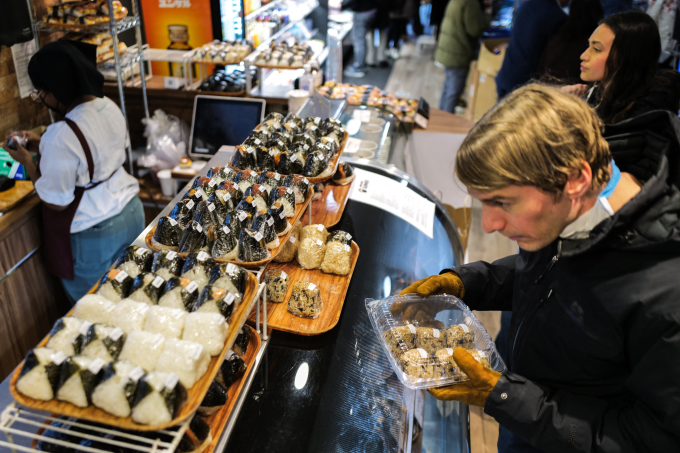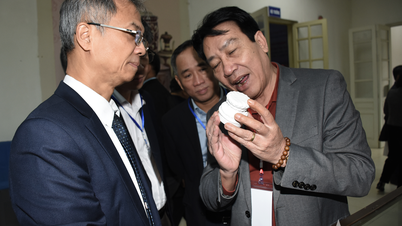Wrapped in seaweed and generously filled with fresh, delicious ingredients, onigiri rice balls are shedding their image as cheap, everyday food in Japan, becoming a high-quality dish that attracts even foreign visitors.
On a quiet street corner in Tokyo, nearly 50 people lined up waiting for Onigiri Bongo to open. "Nobody used to come in the afternoon. Now, customers flock here in droves, forming continuous lines," said Yumiko Ukon, 71, who has run the eatery for over half a century.
Onigiri Bongo sells around 60 types of onigiri rice balls, ranging from traditional fillings like pickled plums to more "modern" fillings like bacon with soy sauce.
The eatery only has nine seats, but sells up to 1,200 rice balls a day. Ms. Ukon says some customers have to wait up to eight hours. "When I was young, onigiri was something people made at home. Now people usually buy it outside."

Yumiko Ukon serves rice balls at Onigiri Bongo restaurant in Otsuka Ward, Tokyo, in December 2023. Photo: AFP
The Japanese have been eating onigiri (rice balls) for over a millennium. Onigiri is compact and popular as a takeaway food. Samurai once carried onigiri into battle. Today, onigiri can be found in convenience stores throughout Japan.
In 2019, the Michelin Guide added Tokyo's oldest Onigiri restaurant, Asakusa Yadoroku, to its list. This event significantly elevated the status of onigiri.
"Since then, diners have begun to view rice balls as a quality dish, rather than just a common everyday meal," said Yusuke Nakamura, president of the Japan Onigiri Association.
In 2022, onigiri was the second-best-selling ready-to-eat food in Japan, after bento boxes. Data from the Ministry of Internal Affairs shows that Japanese people have increased their spending on onigiri and other ready-to-eat rice dishes by 66% over the past two decades. Following Michelin's decision, the number of onigiri restaurants has also increased rapidly.

Japanese diners choose onigiri at Taro Tokyo Onigiri, December 2023. Photo: AFP
The onigiri craze was also fueled by the increased demand for takeout meals during the Covid-19 pandemic, followed by inflation, which forced office workers to tighten their belts on lunch.
Chairman Nakamura explained that domestic rice prices are relatively stable, while imported grains like wheat have become expensive due to the conflict in Ukraine.
Rice plays a significant and profound role in Japanese culture. According to Shintoism, rice is an offering to the gods. The traditional triangular shape of onigiri rice balls may symbolize mountains, where many gods reside.
Onigiri is also gradually expanding globally , as Japan welcomes record numbers of tourists and Japanese culture becomes increasingly popular. The Omusubi Gonbei rice ball chain has opened stores in Paris and New York. Many foreign diners are increasingly seeing onigiri as a healthy lunch option.
"This dish is light on the stomach, easy to eat, and healthy. There's no need to worry about calories when eating a handful of rice," said Sean King, 53, a New York diner.

American diners choose onigiri rice balls in New York, December 2023. Photo: AFP
The Yamada family, who have been rice farmers in Fukushima for many years, recognized the potential of onigiri after a rice promotion campaign following the 2011 nuclear disaster. She posted photos of beautifully presented rice balls on social media, and has been developing her business ever since.
According to Chairman Nakamura, onigiri shops often lack the financial resources for advertising, but the colorful rice balls with various fillings that go viral on social media have significantly contributed to the popularity of onigiri.
Young diners are starting to be drawn to premium rice balls. These variations are made with quality ingredients, feature a variety of novel fillings, and the rice is mixed with grains to increase nutrition.
In 2022, Taro Tokyo Onigiri opened two new branches in the capital, selling premium onigiri for about 430 yen per serving (approximately $2.85). Miyuki Kawarada, 27, the company's president, has ambitions to open dozens of branches overseas, hoping that one day rice balls will dethrone sushi and become the country's most famous culinary export.
"In Japan as well as abroad, I want to refresh the image of the classic, old-fashioned rice ball. This dish is easily adaptable to suit many cultures, and can be vegan or filled with halah," she said.
Duc Trung (According to AFP )
Source link




























![[Photo] Prime Minister Pham Minh Chinh presides over a meeting of the Steering Committee for the construction of the nuclear power plant.](https://vphoto.vietnam.vn/thumb/1200x675/vietnam/resource/IMAGE/2026/02/13/1770947038316_dsc-1534-jpg.webp)

























































![[Infographic] Some investment policies for special-use forests](https://vphoto.vietnam.vn/thumb/402x226/vietnam/resource/IMAGE/2026/02/13/1770965354945_img-20260212-012738-png.webp)

















Comment (0)